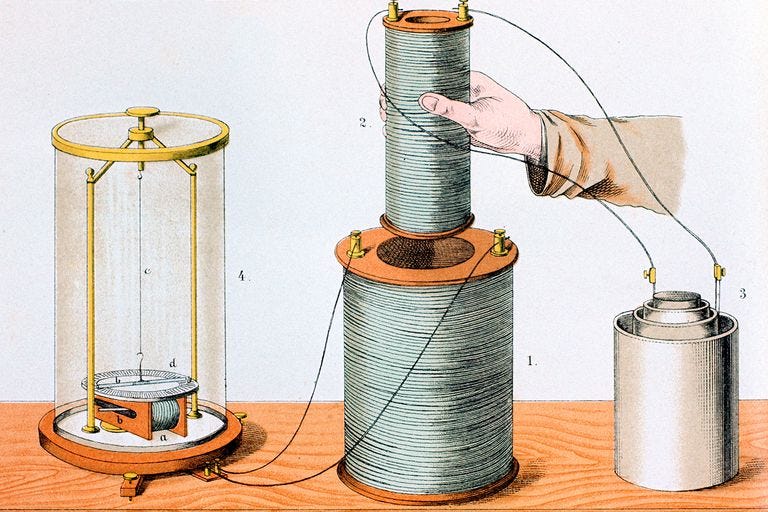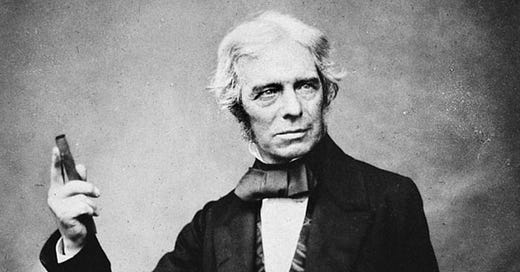
If Faraday Can Do It

Few people in history have succumb such enormous odds.
Michael Faraday is a giant among giants. He is the hero we didn’t know we needed.
Yet, you probably don’t even know who he is.
Michael Faraday was born September 22, 1971. He was born in a small English town called Newington Butts. He was the son of a blacksmith and he grew up poor. His father was often sick and his family often times went without food. He never attended school outside of learning to read at his weekly Sunday school. Instead, when he was old enough to become an apprentice, he learned the skill of book binding. It was all he would need.
This moment changed the world.
Because of this Michael Faraday had access to a lot of books. As he read, he came across the work of Humphrey Davy. He sent Davy a collection of notes he took attending Davy’s lectures and reading his books. As an impromptu resume, Faraday did anything he could think of to get the attention of Davy, who was a scientist he admired. Davy was impressed and hired Faraday as his secretary and got him a job as an assistant at the royal society.
Faraday got his opportunity. He got his chance. He was suddenly surrounded by all the equipment he needed.
Over the course of the next 50 years, Michael Faraday went on to make what were the most important advancements in science and society. He was fascinated with electricity and magnetism and through his experiments, he made huge advancements in the subject of electromagnetism, which is one of the four fundamental forces of nature.
Faraday discovered and quantified what are known as “Faradays laws of electrolysis”, which use math to connect the current flowing through a circuit to the mass of the chemical substance moving through the battery.
What could be considered Faraday’s greatest contribution is “Faraday’s Law.” If you want to understand electricity and magnetism, you need to understand Faraday’s Law. The law describes what is known as “electromagnetic induction”, where you can create a current in a loop of wire by changing the magnetic field around the loop.

Design A Successful Life – Join the newsletter for the best resources for health, wealth and purposeful living.
Faraday’s Law is the foundational basis behind electric generators as well as the modern power grid. Dams generate hydroelectric power through electromagnetic induction. So does the solenoid in your car. Faraday’s law plays a role in circuit breakers, power lines, induction stoves and countless other devices. Any time you are generating electricity by running a magnetic field over wire to generate voltage, you are seeing the brilliant work of Michael Faraday at large.
Faraday’s work was ahead of it’s time. Faraday knew that electromagnetism would one day light up the world. He saw this before anyone else did. Because of how ahead of his time he was, his work was often ridiculed by his peers.
But Faraday didn’t care. His greatest contribution was yet to be met. But this time, he would need some help.
In 1845, through his experiments, Faraday discovered that electromagnetism influenced light. He reasoned that light was actually part of the same “stuff” as electricity and magnetism.
Again, his work was ridiculed. The problem was that due to his poor education, he couldn’t do the math. In steps the famous John Maxwell.
John Maxwell knew Faraday was right and he was an excellent mathematician. At the age of 69, Faraday finally saw his vision realized when John Maxwell published his famous “Maxwell’s equations” which proved that light was in fact part of the electromagnetic field. Maxwell’s equations are groundbreaking in our understanding of the universe and the relationship between light, magnetism, electricity and all massless particles. It became apparent that light was not some magical entity that was created within the ethos of the sun or fire. We could make light through the manipulation of electric charges. Without Maxwell’s equations, we would not have electrically manufactured light. Without Faraday, we would not have Maxwell’s equations.
Albert Einstein used to keep photos of three scientists in his desk drawer. One was Isaac Newton, the other two were Michael Faraday and John Maxwell.
Faraday was poor. He was uneducated. He was often seen as “less than” because of his coming from a lower social class. But he had everything he would need. He had passion, hunger, curiosity and a deep and devoted willingness to experiment and fail.
Faraday got some help along the way. But Faraday seized every opportunity possible to do the work that he loved and as a result, he helped build the foundation of modern society. He will always be one of my favorite historical figures.
He will always serve as a reminder that anything is possible. If Faraday can do it, then so can you.




